#i however will never appreciate the fact he took those pictures in s1…….
Explore tagged Tumblr posts
Note
i just rewatched season 2 recently because of halloween vibes and i forgot how hot steve is in that season🥵 also this is the only season where i kinda liked jonathan, wished they would keep that character version of him
omg season 2 steve is something else i cant w him it’s also so nice bc u really get to see his development in that season AND i actually like jonathan i do think they did him dirty in some parts of s4 tho
#like making it seem like he doesn’t want to be w nancy??? wrong#but he is such a good brother to will it makes me cry#i however will never appreciate the fact he took those pictures in s1…….#anna’s asks
4 notes
·
View notes
Text
Sam and Dean: psychological analysis and headcanons
In response to this anon ask from the 66 SPN Questions:
6. Do you have any psychological headcanons (or canon interpretations) of the characters?
Anon, this is probably not what you asked for. But I started writing, and kept finding more I wanted to say, until I thought--why not just say it all? And by all, I don't actually mean all--this is by no means exhaustive. But it was a wonderful, self-indulgent opportunity to organize my thoughts on Sam and Dean's psychologies, and even find some new ideas as I was writing, and to put them out there so others can read and discuss. (Always happy to discuss any of this! Inbox is open.)
As a disclaimer, I know most of these thoughts are probably not original and may be retreads of many things fandom has been discussing for years. I'm not claiming to be breaking new ground here. Also, I sorta float backwards and forwards chronologically in my discussion--some parts pertain more to them when they're young, some to when they're older, and I don't always clarify which. Also, these are generalizations! I point out patterns I notice; that doesn't make them all hard and fast rules, because Sam and Dean are each human and complex!
Here's what you'll find below:
1. Core motivations 2. Happiness 3. Approval and secrets 4. Approval from authority figures 5. Need and attachment re: others 6. Sympathy and empathy 7. Walls—hiding vs. performing 8. Need and attachment re: each other 9. Ambitions and goals 10. Normality and monstrosity 11. Guilt and self-loathing 12. Autonomy and sacrifice 13. Personal identity 14. Concluding observation
1. Core motivations: Dean’s purpose is to protect Sam, obviously. Sam’s purpose, though a little less clear, is to save Dean. Sometimes it’s explicit, as in s3 and s9-10. But I think Sam also wants to save Dean, in general, from himself and from the life. It’s why he pushes against Dean’s obedience to their father. It’s why he tells him to get out and go to Lisa after he jumps in the Cage. At a certain point, I think Sam accepts he can’t “save” Dean without changing who he is, so he chooses to stick by him—because at least then he can make Dean happy.
2. Happiness: Dean’s happiness—or perhaps contentment is a better word—is knowing that Sam is safe and alive. Sam’s happiness is Dean being happy. In Sam’s world, things are good when Dean’s good. I think that, conversely, Dean wants Sam to be happy, and Sam wants Dean to be safe, but they both know and to an extent accept that those things are not within their control, so they focus on what they feel they can control.
3. Approval and secrets: They are each other’s north stars, guiding principles, in different ways. For Dean it’s “look out for Sammy,” for Sam it’s “what would my big brother think/do.” Dean doesn’t need Sam’s approval. Sure, he loves it when Sam admires him, but if he feels he needs to do something against Sam’s approval, he doubles down because approval from Sam is not the top priority. He’ll do what he thinks is right, especially to keep Sam safe, no matter what Sam thinks about it. Sam, on the other hand, does crave Dean’s approval and cares very much about his opinion. It doesn’t mean he won’t go against Dean (all the conflict of s1-5!), but it affects him differently. This leads to different kinds of secret-keeping: Sam goes behind Dean’s back to avoid his disapproval; Dean goes behind Sam’s back so that Sam doesn’t interfere with what he thinks needs to be done.
4. Approval from authority figures: Dean does crave approval from others—specifically, respected authority figures. The big one is obviously John. I think in a way it’s Mary, too, when she comes back. But it only applies as long as the person has his respect. Sam doesn’t crave approval from other authorities in the same way, perhaps because his primary authority figure growing up was Dean.
5. Need and attachment re: others: Sam is the only person Dean cannot live without, but he also makes outside connections of a friendly nature fairly easily. He’s the more socially outgoing brother who latches onto people like Gordon, gets friendly with Ash, and forges connections with Jo and Charlie, just to name a few (and Castiel at times—though their relationship is so inconsistent and often convenience-based I hesitate to include it in this category). Though Sam is Dean’s core need, I do think Dean thrives with other friendships. I’m not talking about found family, though I’m well aware of Dean’s tendency to call people “family” quite readily. Honestly, I think this is a manifestation of his craving for connection with others. Dean has an affectionate and playful nature, and let’s face it, Sam isn’t always super receptive to that—so naturally, Dean seeks out people who are. (I think this is also, in some cases, related to Dean’s craving for approval from others). Of course, none of those other relationships come close to the depth of his relationship with Sam, and when his relationship with Sam is at its best, I don’t think Dean really needs anything else to sustain him. But in reality, it can’t always be at its best.
Sam, on the other hand, doesn’t forge outside connections easily—but when he does, they tend to be deeper than Dean’s easy casual associations (even when Dean has real affection for someone, he tends to keep the tone of the relationship light). It’s pretty clear Sam was a loner kid, and I imagine it took him a while to find friends at Stanford, and even though he loved Jessica he still clearly kept many secrets. That’s the thing with Sam—he’s got walls. Dean’s got his own walls, but they’re different. Sam can seem emotionally open, but he protects his innermost self very carefully and rarely puts his emotions out there in a truly open way—even less than Dean does. I think this is a consistent personality trait for Sam, not one born of trauma (though perhaps exacerbated by it at times). In fact, it’s in later seasons that I see Sam finally, in rare moments, let down those walls, with Rowena and Jack. When he’s young, I think this was partially a coping mechanism he developed for hiding his desires/feelings, even from himself, because he was so unhappy with his life. It means that even though he’s an introspective guy, he’s not as self-aware as he thinks he is until he’s older and more mature. He’s very good at self-deception when he’s young, because as a thinker, he can convince himself of just about anything.
To circle back to attachment, what this means to me is that Sam, while he certainly appreciates close friendships and has a lot to offer those he cares about, doesn’t crave friends in the way that Dean does. I think he desires to be understood (this is a natural human need) but he’s much more comfortable with himself than Dean is, and is somewhat of a loner by nature. This means he’s also not (usually) going to be too affected by the status of his relationships with others. Dean is much more volatile and easily hurt by others (this is where Castiel is a great example).
6. Sympathy and empathy: On the surface, Sam appears to be the caring, sensitive brother, while Dean is brash and insensitive. This is a very incomplete picture, however. It mostly comes down to the difference between sympathy and empathy. Empathy is an involuntary response, whereas sympathy is something that a person chooses to express, though that doesn’t make it necessarily superficial—it also comes from an emotional place. Dean tends to be more empathetic, and Sam more sympathetic. Dean, despite his performative walls, is more easily affected on a visceral level by others’ emotions. He is more sensitive, more easily hurt or swayed to anger, and also more easily experiences empathy. This has nothing to do with what Dean thinks is right—it’s another involuntary emotion. He is sometimes moved to express this feeling, but he’s not generally concerned about appearing sympathetic. Sam, with his careful emotional walls, isn’t generally so viscerally affected by others, but he is kind. This is expressed as sympathy, because he cares about others’ feelings, and he wants to be good/morally right. On the one hand, it comes from an intellectual place—“it’s socially acceptable/morally right to express care for this person” (which Dean is less likely to care about)—and on the other, it is an emotional response—“I know what that feels like”—but a more regulated one than empathy, where one almost directly experiences another’s emotions.
7. Walls—hiding vs. performing: It’s interesting that both brothers have their own walls, which they construct as a form of self-preservation, but they have different levels of effectiveness in protecting themselves from outside influence. One difference might lie in what the walls were built in reaction to. Sam built his walls at a young age to separate himself from the outside world because, ironically, it was precisely what he desired, but was not allowed to have. He therefore consciously distanced himself from it, to dull the pain of not having it. The goal of those walls was to have something to hide behind, where he could remain generally unnoticed, so he could conceal his pain from outsiders and even from his family.
Dean took a little longer to build his walls—or at least to consciously do so. He already no doubt fashioned himself after his dad as a kid, and often put on a brave face—for Sam, for his father—when he was not feeling brave. He therefore became accustomed to performing at a young age, and performed many roles for both Sam’s and John’s benefit. He was unconsciously building walls with these performances, concealing his true feelings and desires. Later, I think this started to become more intentional, especially in relations with women/sex partners and especially after the Stanford split, as Dean realized how vulnerable to hurt his sensitive nature made him. It was much safer to perform all the time, and never let his real feelings show. For Dean, even more than Sam, I think he often lost sight of what those real feelings were behind the walls as he tried his best to be the performance he was putting on.
For a visual metaphor, I think of it this way: Sam is a boy at the center of a self-constructed labyrinth. He is almost always able to maintain control over how close people get (except when a few slip past his defenses, at which point he may be susceptible to manipulation). Despite all those elaborate passageways, though, there’s still Sam at the center. It’s lonely there, but he knows himself pretty well at least. Dean is a man in a mask who wants the mask to be his real face. He does everything he can to fuse himself and the mask together. They probably are fused at this point, so it would hurt to take the mask off. His memory of the face under the mask is hazy. He’s afraid, if he looks under the mask, he’ll hate what he sees. He’s lonely because no matter how close others get—and he lets them in close, can surround himself with people—none of them will ever see his true face. But he’s convinced himself it’s better this way, because if anyone saw his face, they’d hate it.
8. Need and attachment re: each other: Clearly, both brothers need each other. Sam’s need for Dean is different than Dean’s need for Sam, though. The way I see it, Dean’s need is one that requires reassurance. Perhaps it traces back to the concern about Sam instilled into him at a young age. I think it was strongly exacerbated by the Stanford split, when Dean realized his and Sam’s desires didn’t align. In Dean’s mind, Sam left once and can do it again—he’s always waiting for the other shoe to drop. Sam, on the other hand, has always been able to rely on Dean as a rock, a constant in his life—to the point that, in a way, he takes it for granted when he’s younger. Not in a spoilt, ungrateful way, but in that way that we, as children, might take our parents for granted—they’re always going to be there, right? That’s why, on the few occasions where suddenly, Sam isn’t sure of Dean’s devotion, the rug is ripped out from under him and he’s completely adrift and distraught—seasons 4 and 8 come to mind. Sam needs to be the center of Dean’s universe. When he fears that that’s shifted, that Dean hates him or has chosen someone else over him, it turns Sam’s whole world upside down. For Dean, the fear is that Sam will leave, but it’s a constant, background worry. For Sam, the fear is that Dean will hate him, but since he can usually count on Dean to be obsessed with him, it only comes up now and again. Only Dean can truly hurt Sam, while Dean is vulnerable to hurt from others—though, as always, the deepest hurt can only come from Sam.
9. Ambitions and goals: Sam is the one with greater needs and ambitions outside the scope of their relationship. For Dean, if he’s got Sam and he’s got hunting, he’s content. His greatest accomplishments are taking care of Sam and saving people, and that’s all he needs. I see Sam as craving other sources of fulfillment, though—academic/lore study for its own sake (the pursuit of knowledge), and a leadership/mentorship role. I thought it was very fitting that Sam finds these in late seasons, with leading hunters against the BMOL, then leading the apocalypse AU hunters, then mentoring/nurturing Jack. Dean has always had (and needed) a mentor/leadership/nurturing role with Sam, but Sam also thrives when he’s able to step into that role for others.
10. Normality and monstrosity: I’m just going to link to this post rather than repeat myself.
11. Guilt and self-loathing: This is something they both struggle with and at times, are defined by, but it manifests differently. I think their Hell traumas exemplify their different brands of guilt: for Dean, it’s perpetrator’s guilt. He knows he did something terrible and feels he can never atone for his past actions. For Sam, it’s victim’s/survivor’s guilt. He may not have done anything wrong, but there’s a certain amount of self-blame, especially for perceived weakness. This is another theme for Sam; one of the main faults he sees in himself is weakness—too weak to save Dean from Hell for instance—and as a result tries to shoulder things alone (killing Lilith, Hallucifer, etc). Sam has a need to fix things, to prove to others and himself that he is capable. Dean, I think, sees his main fault as neediness, but really, it’s a deeply buried sense of innate worthlessness. He was taught from a young age that his brother’s life—not his own—was of the utmost value. He internalized that his life was only worthwhile if he could save others, and has trouble with the idea that he, himself, has value beyond what he can do for others.
12. Autonomy and sacrifice: The above leads Dean to have a very constrained sense of his own autonomy. In general, he values duty/loyalty to others over autonomy (although when it comes to cosmic beings, he’s all about free will—see this post if you want more thoughts on that, and Sam’s autonomy). Often, his desire to control others comes from a place of frustration when Dean feels they are neglecting duty/being selfish. I think partially duty towards others is really a deeply ingrained value for him, but there may also be some buried jealousy at play, in that Dean wishes he could act with more freedom, put himself first every once in a while, but doesn’t know how to. Sam tends to value autonomy over duty (this doesn’t mean he doesn’t believe in any sort of responsibility—he’s willing to sacrifice for the greater good, after all). This means he also tends to respect others’ autonomy, though we all know he can get plenty unhinged where his brother’s safety is concerned. The theme of Sam and autonomy has been talked to death so I’ll stop there, but you can click the link above if you want more.
13. Personal identity: One of Dean’s biggest struggles is with how much of his personal identity is received rather than self-determined. He is tasked with taking care of Sam and he is trained to be a hunter; these become the foundations of his identity. He says it himself: taking care of Sam is not just what he does but who he is. Then in season 3, his own subconscious mocks him for his lack of originality, styling himself and all he loves after his father, showing that this is a source of deep insecurity. This discomfort with himself contributes to his fear of being abandoned and left alone with himself. He doesn’t know who he is without Sam—or rather, is convinced he is nothing without Sam, which is why he fights so hard to keep him by his side. It also contributes to his general desire for friends, or better, family: people who won’t abandon him.
Later in the series, I think Dean has come to embrace his genuine self more. He’s nerdy and excitable and playful—and I don’t see this is as regression, but rather a healthy embracing of what makes him happy—not tastes inherited from his father. If it seems juvenile, it’s because it’s the first time in his life he’s allowed himself to express and explore these things. I think his relationship with hunting is also healthier; it’s no longer something he does because it’s the only thing that can give him worth. He does it because he believes it’s right and genuinely wants to help people. He has a more complete sense of self, and while it’s still totally tied up in Sam, he has gained some self-worth.
[I should note that basically everything I’ve written about Dean supports the headcanon that Dean has BPD—a headcanon I accepted after I realized this. For some more great writing on Dean and BPD, see this post by @venhedish.]
Sam has always known what he wanted for himself and rejected what was given to/allowed him. Wanting what he couldn’t have, from a young age, helped him develop an individual sense of self, not defined by others. I think it’s this difference in their sense of individual identity that leads some viewers to think that Dean loves Sam more than Sam loves Dean. He doesn’t, and losing Dean is just as huge a loss and a grief for Sam as losing Sam was for Dean. Dean is central to Sam’s life, and he can’t feel complete without him; however, his identity and every desire has never revolved as entirely around Dean as Dean’s has around him, so Sam has a foundational sense of self that even losing Dean can’t completely destroy. It’s what allows him to rebuild in grief and carry on (whereas I have no doubt Jensen’s right and Dean would waste away in the back of a pool hall without Sam). Dean’s central role in Sam’s life never disappears, though, and it is, in fact, what allows Sam to carry on; an effort to honor his brother’s memory, living in a way that would make him proud. There’s continuity in that for Sam; the craving for his brother’s approval and happiness never disappears. Seeking those things is what makes Sam happy, both in their domestic years together before Dean’s death and in the years after. They are both, after all, co-dependent!
14: Concluding observation: Sam and Dean have many similar issues, desires, and insecurities: the desire for a normal life, the fear of their own monstrosity, the desire for love and friendship, their need and love for each other, their desire for approval/to be admired, resentment at their childhood, the feeling of being impure and unworthy, the desire for freedom, issues with bodily autonomy. Sometimes these are seen as the purview of one brother or the other exclusively, but that’s almost never true when you consider canon as a whole. The difference is in how these things are internalized, sublimated, reflected, and expressed for each of them. It makes sense they would struggle with so many of the same things, because their lives are deeply intertwined and they are in the same boat most of the time.
#spn meta#sam meta#dean meta#sam and dean#winchester brothers#my meta#the brodependency#long post#spn
116 notes
·
View notes
Text
Personal Ranking | Winx Club Fairies
This is based on the events of of all Seasons (though mostly S1-S4), my interpretation of the show and (partially) the Winx Club Wiki.
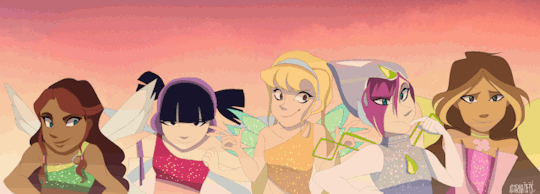
Surprisingly enough this is MY opinion, partially substantiated with facts. My opinion is mine, you can agree or disagree all you want. I am in no way trying to offend anyone by giving my opinion on fictional characters in a kids show.
Capiche?
I want to point out that just because characters are low on my list that it does not mean I hate them per se. I’m simply limited to rating 6 characters, and one has to be all the way at the bottom. Don’t get me wrong, this isn’t random, however just because someone is at the bottom it does not mean I hate them; or think they shouldn’t be in the show.
So let’s start with my least favorite fairy shall we?
6. Bloom
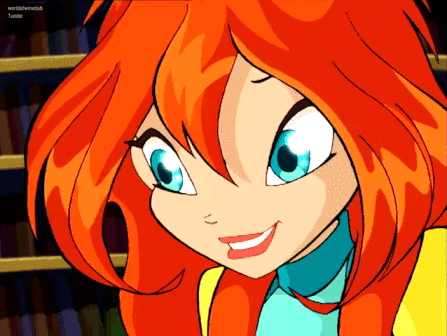
Why Bloom you say? Well, in all honesty even as a child I didn’t like Bloom all that much. To me she was always too perfect in a sense. Like yeah she’s quirky and doesn’t know much, but that is such a typical trick used by writers to try to hide the fact that they made her super over powering compared to like everyone else. The idea that a normal person suddenly discovers magical powers and then becomes one of the most powerful creatures in their universe is already a major cliché.
On top of that the writers made her more and more of a Mary Sue as time went on, and after Seaons 4 pretty much all of the little personality that she had disappeared and she was just the “do good, all good, always right, all powerful” dragon fairy. In the first season she’s interesting for what she is but her character arc isn’t satisfying. She goes from being the quirky all-good powerful fairy to being the perfect all-good most powerful fairy off all. Like really, if Bloom is so powerful why doesn’t she just blast all their damn enemies away? She can clearly do it.
Of course the show would be over very quickly, but if a writer runs into those problems it is not their job to create more bizarre obstacles, or ignore the power they’ve previously clearly possessed, but to take a step back and maybe dial down the character entirely.
Another issue I have with Bloom is her “courage”. Yes, courage is good, but with Bloom it’s so annoying and frankly... dangerous. This falls back into the Mary Sue trope I mentioned. This is another thing writers often do to cover up the fact that they’ve created an overpowering character. Bloom is always pushing everything, and everyone, and it gets annoying! She’s always the one to be like “C’mon girls, let’s do this!” and then they run off to do something that they shouldn’t even be able to do. I have to be fair on the show Season 1 does this the least, in S1 Bloom is still coming out of her shell, but after that it just gets extremely irritating.
5. Musa
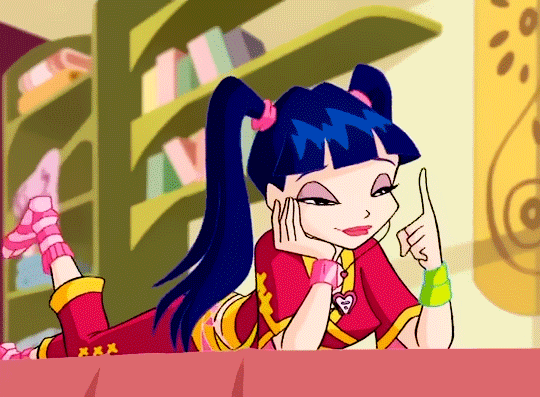
So, Musa. Where to start with her? I want to come out right and say, make clear once more, that just because she’s low on my list it does not mean I hate her. In previous discussions it has been a misconception that I do, but I don’t hate Musa in the slightest.
What I however do hate is how pretty much her entire personality is I love music, my moms dead & I get upset over Riven. I could never relate to Musa, she’s far too sensitive and impulsive (dumb you could call it as well) for my liking. I think Musa could’ve been a great character to me had her personality been more individual as oppose to majorly revolving around her relationship with Riven. I don’t mind sensitive and impulsive characters, but I am severely against toxic relationships like that of Musa and Riven.
My issue with Musa lies more with the show itself than the character. I think it is irresponsible of a kids show to promote relationships like that of Musa and Riven. Their relationship is toxic and I feel a dread whenever I think about a young child who looks up to Musa, because they also love music, and naively finds her relationship with Riven an inspiration. The show already pushes this idea on young girls that they need a boyfriend, and when it promotes toxic relationships like that of Musa and Riven it can be severely damaging.
I can’t rank Musa any higher because for me Musa’s character has been mostly defined by her romantic relationship. Yes, she loves music, is sensitive and has a dead mother, but really that is all I get to know about her; especially since her relationship with Riven is so damn distracting.
I think Musa should’ve broken up with Riven for his abusive attitude and that she should’ve stayed a single queen. It would overall send out a much better message to younger audiences.
4. Stella
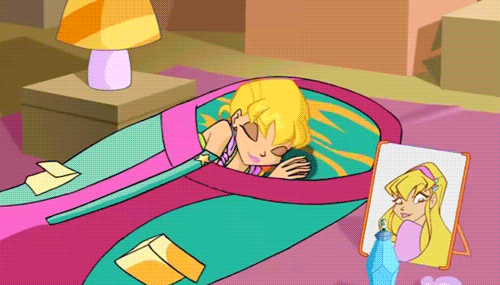
Stella... there’s a lot to take in. I actually really like Stella, I adore her character especially in the first couple of seasons. However later seasons ruin her character, and not just like a little bit. No they took Stella’s character, and then a bulldozer, and then ran over Stella’s character with that bulldozer 30 times in a row. Then looked down at the dusted up remains of the character and tried to rebuilt her with that remaining dust, the product?; Stella Season 5 and beyond!
As a child I didn’t like Stella; she was too girly for my liking, but I grew a love and appreciation for her character over time. She is a strong, smart and kind human being that just also happens to be very pretty! She is always there for her friends, and although sometimes being a bit ignorant she always feels bad when she hurts her friends feelings, it never feels like she’s overly self-centered because she actually understands what she does wrong most of the time. There is absolutely nothing wrong with being a pretty girly girl type person, however the show DESTROYS everything they built for Stella after Season 4.
S5 STELLA AND BEYOND IS THE WORST THING EVER! HOW COULD THEY DO THIS TO MY PRECIOUS BBY STELLA!?!? What did they do you ask? THEY MADE HER A TYPICAL DUMB BLONDE.
I feel pure rage over the “development” of Stella over the seasons. She went from being a kind, confident, stylish young lady in Season 4 to being a dumb, self-centered blonde girl in Season 5. I am disgusted. The writers were doing so well! I praise the show for not making her dumb blonde from the start, because it would’ve been so easy! But they didn’t, at first. But then Season 5 came along and suddenly all she can care about is her effing hair and nails!
3. Aisha/Layla

I've heard it before, and I’ll probably hear it another million times “If the black character isn’t your favorite, that means you’re (secretly) racist.”
This is obviously complete and utter bullshit. My opinion is my opinion regardless of the characters ethnic background or skin color. In fact it genuinely disgusts me how S8 and WOW white washed Aisha, and it is the very reason I refuse to watch any future seasons.
So, let’s chat Aisha, shall we? Don’t get me wrong here, I actually really like Aisha. However I had to make a tricky decision when making this list; having a clear idea of who I wanted at 6 and who I wanted at 1 but having difficulty with everything in between. Aisha isn’t here because I have an issue with her character; she simply isn’t any better to me than the following characters.
Aisha, although an undeniable badass, never really appealed to me all that much. I think it is partially to do with her coming in in the second season; and barely any time being spent on her as a character later on aside from her quest to help the pixies. I hate how her grief over Nabu, and Nabu’s death, is pretty much glossed over and they give her a new love interest almost instantly. No they don’t start dating until later, but it’s very heavily inclined that Roy (and later Nex) is supposed to be her love interest. Aisha should have, just like I said with Musa, been a single queen. You don’t just get over the death of your engaged, and the show acts like it’s nothing; that you’ll just be sad for a bit and then get over it when another handsome boy comes along.
Aside from my irritation with the love interests I adore her for being a strong character; which I’m sure many young people can look up to, and I certainly don’t dislike her character. She’s a solid characters with a lot of strong motivations which I can very much appreciate. Out off all the Winx she feels most genuinely determined to reach he goals; yes so is Bloom but with Bloom it doesn’t feel as genuine, it just feels like blind courage. While with Aisha it truly feels like she has motivations for the goals she wants to reach.
2. Flora
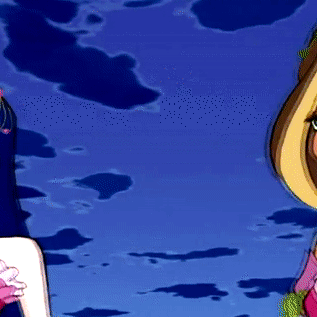
Flora is a lovely character, and just like with Stella I feel like they ruined her as time went on which is a shame. I know Flora is the favorite of a lot of people, and it’s very clear to see why.
To me she is most relatable; she’s compassionate, smart and is overall a beautiful being both inside and out. I have very little issues with Flora as a character, she’s lovely and I feel there is no glaring issues to address. In terms of being a role model to a younger audience I’d say she’s a fine role model; she has no glaring personality issues or major drama she goes through. The fact that she gets upset over Crystal in S5 feels extremely out of character, but like I said, just like with Stella they pretty much ruined her character as time went on. S1 through S4 Flora is a wonderful character and I entirely understand why she’s the favorite of so many that watch the show.
Personally I have always adored her as well; I like her connection with nature and her compassion was something I looked up to as a kid. Yes she still has flaws, just like any of the other girls, but her flaws aren’t flaunter nor made an issue of. She’s a bit insecure (S1-S3/4) which is fine, she gets encouraged by her friends to be more confident and overtime she has her own mini character arc. It’s not major, and her character isn’t ground breaking, but she is a lovely character and a picture perfect example of what a main character in a kids show should be like; a good role model.
1. Tecna
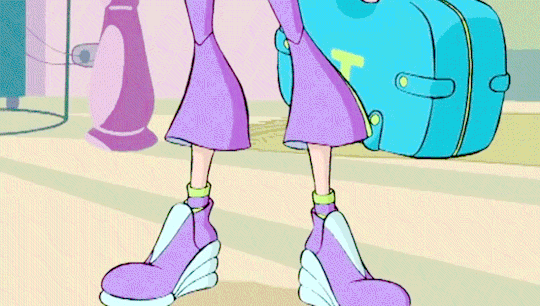
You already knew this was coming, of course! She’s the last one left. Plus I make it fairly clear she’s my favorite.
I know a lot of people don’t like Tecna, but I absolutely adore her character. So much so that I already, previously, wrote an entire blog post about it. But I’ll summarize it a little bit.
Tecna is my personal favorite fairy because she has a lot of qualities that I admire; she’s confident, grounded, modest, loyal and extremely intelligent. I’ve heard people complain that she’s their least favorite because she’s too serious; but that’s her purpose! Within this group of highly emotional and impulsive people you need someone to be a voice of logic and reason. Someone that doesn’t get highly emotional over everything, someone that thinks before they act! I tell you, without Tecna all the girls would’ve been dead a long time ago.
Back to the role model thing I keep mentioning; I think Tecna is a good role model for the younger audience that watches Winx Club. She’s confident but modest, she’s super smart; and when she doesn’t know something she always tries to figure it out. She also has the most healthy romantic relationship out of the 6 girls and I personally think that’s worth applauding as well.

So, that’s my take on things. As always, feel free to express your own opinion; as long as you do it in a civil way. I would love to hear what others think and feel on the matter, whether that be about what I said or simply their own ranking.
#winx#winx club#winx club bloom#winx club musa#winx club stella#winx club aisha#winx club layla#winx club flora#winx club tecna#winx bloom#winx musa#winx stella#winx aisha#winx layla#winx flora#winx tecna#character ranking#MY OPINION!!!#alfea
5 notes
·
View notes
Note
why don’t you see how “clary the god” negatively affected magnus? in s1, 2a they only let magnus be part of the group when he was doing things for the shadowhunters. and so in 2b, 3a, 3b when she was god, he was cut off from everyone but alec cuz they didn’t need him anymore (and god forbid he gets to be actual friends with anyone. cuz no, only saying “biscuit” to clary, nada to jace, and 1 scene with izzy per half isn’t friendship when the shadowhunters and simon are being pals every single ep
magnus literally didn’t say even 1 word to clace- you know the main characters of the show- in 2b. not 1 word. and you can count his lines of dialogue with them in s3 on 1 hand, literally. meanwhile alec’s out here getting arcs with both of them every single half. i mean, you claim to like magnus so why you don’t care about him as part of the group? cuz everytime i see you hype “clary the god” it feels like a punch in the face cuz that choice cost magnus all his screentime with the other mains.
why doesn’t it make you uncomfortable that they gave a white character (1/3 of the mains) powers just to cut the only asian main from the group dynamic so that it really just became only the 3 whites and 2 hispanics spending time together at the center of the show, while the 1 asian and 2 black mains were always cut off and on the outside (and not allowed to connect to each other, cuz god forbid POC mains connect to each other instead of merely being “spokes” on the whites “hubs of the wheel”.
it is such a joke that so many fans are crying “clary deserved better” in the finale and that it was bad to derune her- WHERE was that energy when magnus gave up his magic for all of 3b? no fans cared cuz “oh he’ll get it back.” so would she, her last scene with jace showed she may not be a god anymore but she was still a shadowhunter. he suffered all of 3b and not 1 single character outside of alec and his mom said even 1 word of comfort to magnus. not one!! why do only white tears matter?
“clary the god” ain’t as cute as you’re acting like it is unless you only care about her, in which case your username is misleading. also doesn’t it bother you that an asian’s man accomplishment (creating the portal) is dismissed when the white girl can do it with zero effort on a whim? you can tell this show is run by whites. or that they barely let magnus do magic in s2/ s3 cuz they didn’t want to spent their cgi budget on him but they had no problem blowing it on her playing god? yikes.
there are a lot of very valid points here and i’m glad u got it all out, let me answer thoroughly!!
point 1: magnus doesn’t get enough screentime
agreed. the writers don’t appreciate him at all. he does get more screentime as the show goes on though, he isn’t part of some episodes in season 1 and 2a, they change that later
point 2: magnus doesn’t get to interact with the other mains and doesn’t get friends because of clary’s powers
i partially agree with this, i never made the connection to clary’s powers but it does make sense since magnus was often used as a plot device in the beginning. however, i don’t think he even is meant to be friends with some of the group (or maybe he is, the show generally is really bad at building family and friendships because they don’t really let characters interact) so i don’t think it’s /horrible/, however i do think that he should be getting more of his own storylines and that the storylines he does get should be more explored and he should be allowed to get more scenes with dot or catarina
point 3: clary having god like powers is racist
first things first: clary is the main character of the show, the show is meant to be about her. she is supposed to have more screentime than everyone else, it’s her storyi don’t think that they gave clary her powers with the intention of cutting out magnus’ screentime, i think they gave her those powers to move the story forward. that doesn’t change that they give far less screen time to poc, and i agree that they shouldn’t have done that.
point 4: no one cares about magnus, everyone just cares about clary
this is the point i gotta say i disagree the most with, maybe it’s perception, maybe it’s because of the people i follow, but i had a completely different experience for this. i remember several posts about magnus losing his magic and how it must have affected him and metas and fafics and everything revolving around this topic. i personally have rarely seen anything about clary.but that’s the fandom, i do agree that the writers should have let many more characters who supposedly care about magnus talk to him about his magic loss (refer to point 2)
point 5: the last message
“clary the god” ain’t as cute as you’re acting like it is unless you only care about her, in which case your username is misleading.
i clearly care about clary and i’m not really making anyone think that i don’t, my icon, title and description all reference her. i don’t exclusively care about clary, otherwise i’d exclusively blog about her. i understand how from your point of view the clary is god concept is bad, but for me it’s a fun theory, i just like it, i don’t think about how clary having some of her powers could have maybe potentially lost magnus some screentime, i think about how amazing it would be to see clary with glowing eyes and flying hair ripping raziel apart. i think about how funny it is that clary came into a new world and a two months later was like “yeah i can bring people back from the dead, what about it?”. i think about how due to the writers having given clary those powers, whether they should or shouldn’t have is open for question, clary is about as powerful as warlocks, the most imo most powerful beings in the shadowworld, and due to clary defying the angel’s will she’s more powerful than the angels, so? clary is god.
i like to focus on the story, because yes, shadowhunters is deeply problematic, i never doubted that, but i’m honestly here to have fun with it and i enjoy talking about the concept, if i only ever focused on the stuff i don’t like about the show, the stuff i disagree with there’s no point in having this blog
also doesn’t it bother you that an asian’s man accomplishment (creating the portal) is dismissed when the white girl can do it with zero effort on a whim?
sure that’s p fucked up, when it comes to clary the writers just make her be able to do anything, which is a flaw, i know that’s what your entire message is. yes. it is wrong that clary can just do things that push magnus out of the picture, it is something that shouldn’t be done. but clary being able to do anything at any given time is also a bit funny, because it’s bad writing and that bad writing is what makes her god, you know?
or that they barely let magnus do magic in s2/ s3 cuz they didn’t want to spent their cgi budget on him but they had no problem blowing it on her playing god?
maybe it’s due to my lack of perception but i really never noticed that, i can think of many instances where magnus uses magic, in fact there’s a lot more (or at least better) cgi in season 2 and 3 than there is in season 1, so i’m not sure that statement is factual
so! in conclusion: thank you for your message, it really gave me a great insight on why someone might not like the theory and it’s understandable! but for me it really is just something to have fun with because it lets me make fun of the show due to its ridiculous writing and lets me appreciate clary, two things i love doing. you took things a lot deeper than i ever intended them to be, but we all love the show while complaining about things that were problematiqué. i don’t see how my god clary theory is really harmful as it is only based on things that are shown in the show. things that maybe shouldn’t have happened, yes, but in the end they did and all we can do is get angry at them, ignore them, or make something with them.
conclusion: the god clary theory is just meant to be dumb fun, it’s completely okay if you don’t like it, or can’t like it if you feel like it’s based on injustice or for any other reason
thanks again! have a nice day!!
#Anonymous#answered#i hope i'm being coherent askmdkms#this is rlly long sorry to everyone scrolling past this rip#rlly took me 1 1/2 hours to answer this rip anon gave me some content there!!#god clary
7 notes
·
View notes
Text
Ryoken and Playmaker’s Identity

Anon asked: “Hope it’s okay to ask. I find your analysis very interesting. How do you think Ryoken felt when he learned about Playmaker’s identity? What of his feelings when Yusaku told him they lived in the same world? And the recent development between him and Yusaku. Despite being rivals, Yusaku still sees him as his special person. How do you think Ryoken copes with that?”
Sorry this took so long! Let’s right down to it!
So at first, Revolver really didn’t care who Playmaker is, whether he managed to do what they couldn’t or not. He thought Playmaker was just another person that had a grudge against the Knights of Hanoi, because there are apparently quite a lot. And considering that most of the organization was just a means to an end, Ryoken felt like Playmaker and whatever he held against them was unimportant. Ryoken is always keeping the bigger picture in mind at this point; he’ll do whatever it takes to destroy the Ignis, no matter who gets hurt. The grievances of other people can’t compare with the big bad threat against humanity!
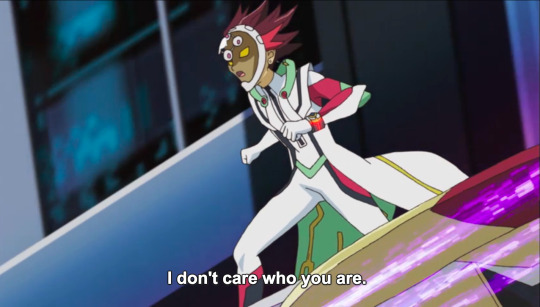
But as the duels go on, he gets more interested. Right up until Yusaku says “three things”.
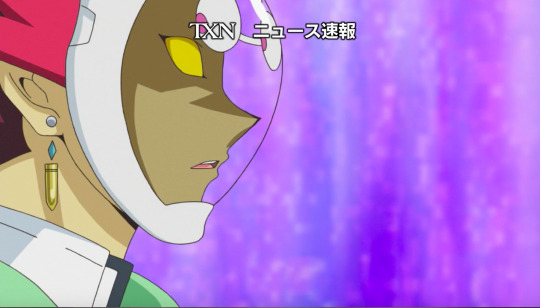
Rev gasps then. As far as I know, this is the first moment we see Revolver have such a genuine reaction to anything since closing the Cyberse. Before this, it was all smirks and mocking and disregard. He’s caught off-guard, and you can see it on his face. He goes through a lot of emotions: surprise, disbelief, dismay, and then anger.

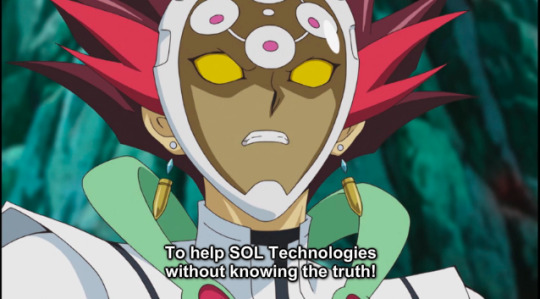
He seems betrayed. Even jumps to the assumption that Playmaker is helping SOL, even when he has evidence to the contrary. He’s angry and irrational in this moment, like he’s been hurt. More than his loss, this is what seems to hurt him most. Playmaker “choosing” SOL over him. Revolver perceives this as a sort of rejection, and feels wronged by it. Playmaker, as some nobody, hating Hanoi and “helping” SOL didn’t bother him in the slightest. But Playmaker, as the child he saved, hating Hanoi hits Ryoken hard.
When Kogami interferes, he snaps out of it. He recollects himself, and gets back into character as “Revolver”. Here we see Ryoken’s faith in “fate” kicking back in, and he retreats, knowing that this isn’t the end of the matter.
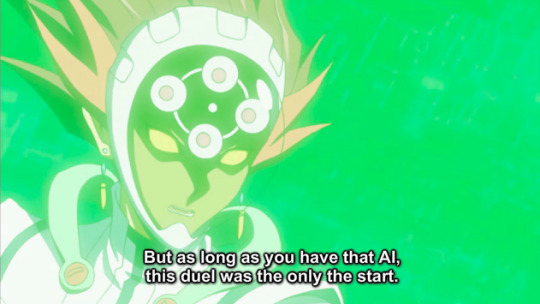
Upon his return, we see Ryoken scowling in the hall. He’s failed, lost an arm, and someone important to him has turned against him. This is the first time we’ve ever seen Revolver look so frustrated outside of the duel with Playmaker. He didn’t even make this kind of troubled expression when the Ignis they’d been hunting for ten years was captured by an enemy.
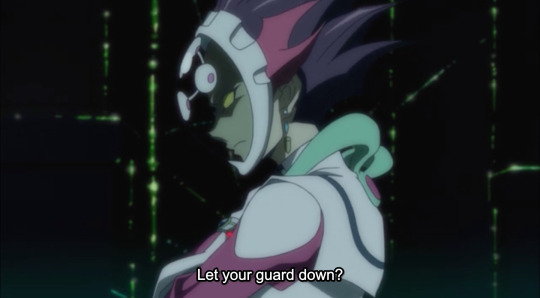

Kogami is right about Ryoken being shaken by the mention of the incident, but he seems to think that it is just because Yusaku is one of the victims, not a particular victim. It doesn’t seem like Kogami knows about his son talking with Yusaku during the incident. This may seem like a small detail, but it does suggest that Ryoken has been hiding everything in regards to his relationship with one of the test subjects from his father since the beginning. For someone who admires is father as much as Ryoken, who even compares his father to the gods, that Ryoken feels he needs to hide this tells us a lot about its relevance to his “mistake”: ending the Hanoi Project. Ryoken doesn’t want to bring up the victims, or at least one particular victim, around his father. We’ll get back to that later.
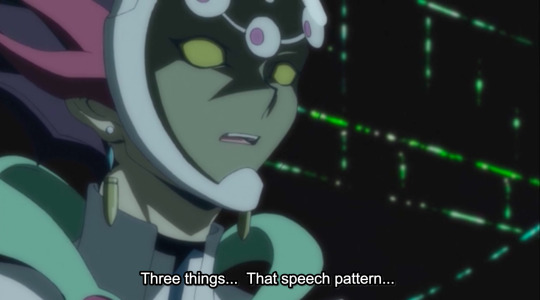
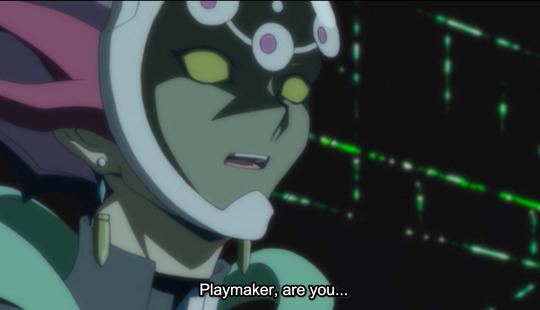
Meanwhile, Ryoken still seems to be in shock. His initial anger and betrayal givens way to doubt and disbelief. It seems rather like he doesn’t want to just accept it, but the evidence is right there and he can’t ignore it. He stands there processing it, taken aback by this turn of events. It’s pretty clear that Ryoken never saw this coming. Maybe because he reached out to Yusaku, or because Spectre came back, but either way, it doesn’t look like Ryoken was prepared for Yusaku to ever come back and challenge them. Who knows what he thought and hoped Yusaku was doing instead, but is seems he never even once considered the possibility.
But once he does process it and accept, Ryoken almost seems…okay with it? Not exactly resigned, not exactly glad, but he accepts it thoroughly. I believe what he feels from then on is a sort of kinship with Yusaku. Yusaku hasn’t been able to move on from what happened in their childhood either, Yusaku is still fighting, Yusaku can’t and won’t forget what happened—all those things seem very important to Ryoken.
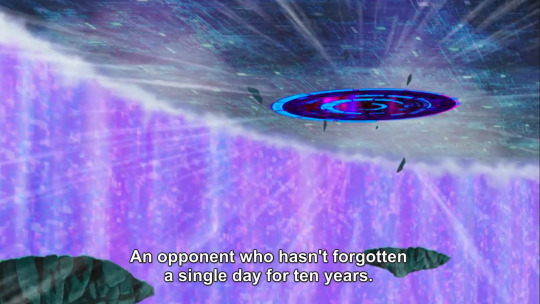
Ryoken maybe even appreciates it, is grateful Yusaku hasn’t moved on. I think for Ryoken, Yusaku is proof that he’s not alone either. The two of them share a destiny. Ryoken clings to his father’s expectations of him, to be the savior of humanity, but every “hero” needs a “villain”, and I think part of Ryoken was relieved to find one in Yusaku. No doubt, this emotion intersected with Yusaku’s confession about living in the same world, because Ryoken knows all about feeling like you can only walk one path forward, about feeling isolated and trapped.

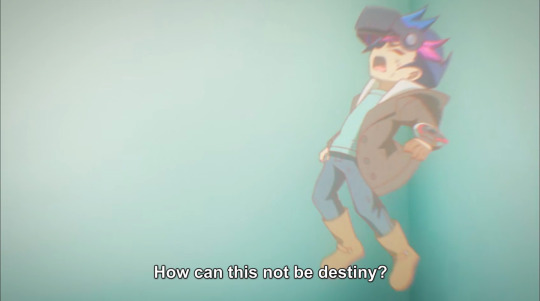
He uses his faith in destiny to cope with Yusaku being Playmaker, his “arch nemesis”, and he uses Playmaker to cope with what he sees as his “destiny”. The two feed into each other as Ryoken tries to keep himself together in the face of what the future holds, resulting in the obsession we see for the rest of the series.
The Knights of Hanoi have two plans to save humanity:
Plan A: Find Playmaker, take back the Dark Ignis, locate the Cyberse, and destroy it. Vyra makes the Another Virus to lure Playmaker out, the Generals all get comatized and trapped in the network (and they actually do uncover Playmaker’s identity, but we’ll get to that.)
Plan B: Nuke the Internet with the Tower, destroying the Cyberse and everything else.
They only need one plan to work, and Ryoken favors Plan A for all the wrong reasons.
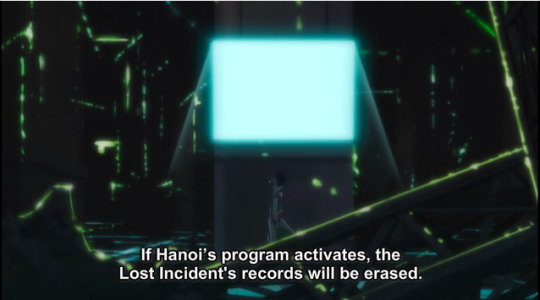

If the program activated, Kogami would be a dead man all over again. But it seems like Ryoken was already resigned to this, as his main concern is not the impending death of his father or the thousands of others being placed in the line of fire, but finding Playmaker, the child from all the way back then. That in and of itself reveals a lot of the depth behind Ryoken’s feelings about Playmaker. However you chose to interpret the nature of those feelings, I think a good word for them is: all-consuming. Revolver is right when he pegs it as an obsession. He’s desperate to find the one from ten years ago again, just like Yusaku is.
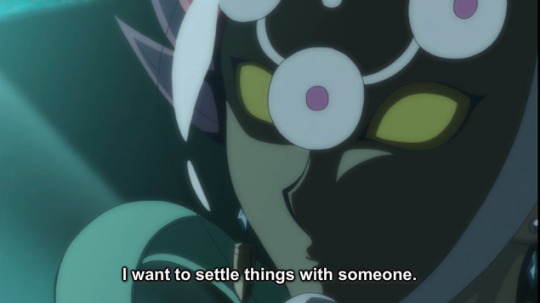
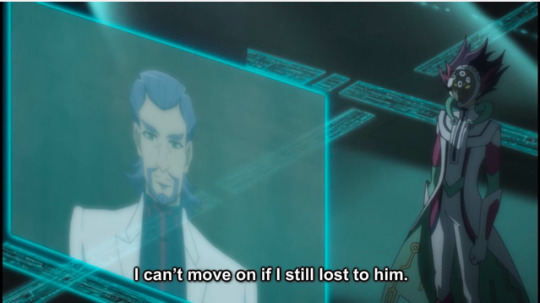
Ryoken wants to settle things with Playmaker, but that doesn’t require knowing his identity. In fact, those two things never intersect in the first season at all: even after learning Yusaku’s identity, it’s not like Ryoken uses it to get him to duel him. He doesn’t do anything with it at all. They seem to be entirely separate goals that just regard the same person. He wants to know who the child from back then is. He wants to defeat Playmaker.
Moving on to the final identity reveal, we have the Smile.
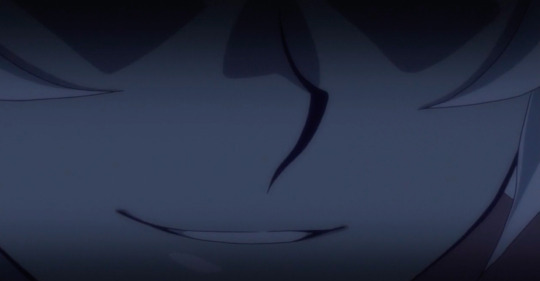
I made a post ages back about this scene and the implications it had both on its original airing and in hindsight post S1. And I think the conclusion I came to then is still on point: Ryoken doesn’t smile because he intends to use Yusaku’s identity to defeat the Ignis, he smiles because he final knows who Playmaker, the sixth test subject, really is. His curiosity is satisfied.
Is he happy to see that the child he saved had a chance to grow up? I think so. The smile above seems to say “Well damn, it really is you” or something along those lines. Triumphant, I suppose.
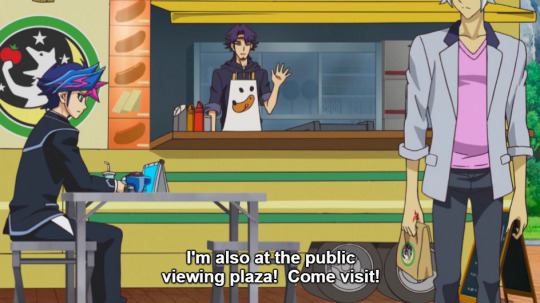
He goes down to Kusanagi’s truck and looks at them, monitors his enemies even though it nets him no information on them, or at least, no information he ever uses against them.
Did Ryoken go all the way down, just to see them? Based on the evidence, that’s the only assumption that can be made.
At this time, Plan A could have been a complete success, and the Tower would never have needed to activate at all, if Ryoken just used Yusaku’s identity like everyone intended for him to. His family could be saved, and no one else would have to get hurt, except for Yusaku.
Problem being, after his initial reaction of dismay, Ryoken almost seems pleased that Yusaku has come back. And they still haven’t settled things. Once more, we have to acknowledge that Ryoken’s desire to duel Playmaker was completely separate from his desire to know his identity, even if he never verbally drew a distinction between the two. The two goals never intersected at all, but all the others (and us the viewers) just assumed they did.

Ryoken even acknowledges how messed up his priorities have become, but he still can’t overcome it.
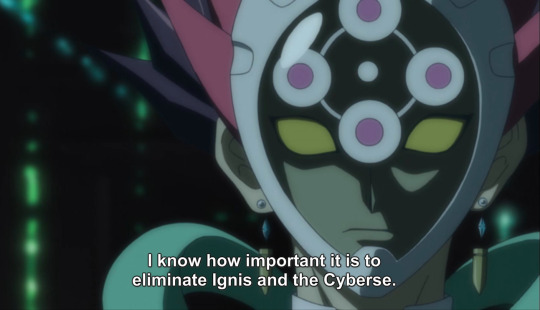

But with the identity loose end finally tied up, Ryoken can focus on the Tower of Hanoi. Before he found out Playmaker was one of the victims, his father was the one asking for more time.
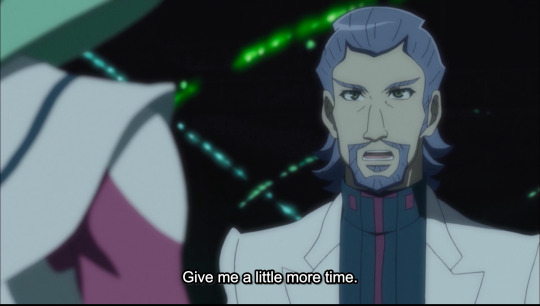
Afterwards, its Ryoken asking to delay.

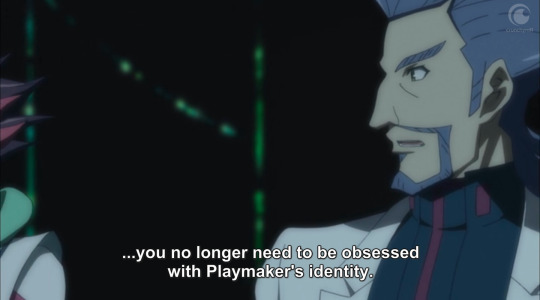
Going with Plan B, they ditched Plan A, even though they had everything they needed to make it a success. But of course, Ryoken hides this from his father, blatantly lying to his face about knowing Playmaker’s identity. At this moment, whether he understood it or not, Ryoken essentially chose Yusaku over his father. Between Yusaku and Kogami, Ryoken pretty much decided which one of them was going to live and which one was going to die with this lie. Had he told the truth, Kogami would not need to sacrifice himself for their plan, no matter how accepting of his own impending death he was.
Just like ten years before, when Ryoken unwittingly chose the six children over his father, he makes the same decision all over again, but for drastically different reasons. And once more, he regrets it when his father is killed all over again, as he finally comes to understand that his actions once more have consequences on his family.
He despairs, and decides to make it right by killing Yusaku, Ai, and himself.

The Tower of Hanoi duel is Ryoken’s lowest moment. He’s going to kill everyone he cares about for his father’s mission and as his “punishment” for once more betraying his father’s expectations of him.
And then Yusaku saves his life. His father is dead, the Tower failed, and there’s nothing he or anyone else can do about it. Ryoken takes months, seemingly, to pull himself back together from this blow, and at the end of it, his feelings about Yusaku are even more complicated. Ryoken has always had the tendency to blame himself before he blames others, so it’s not surprising he doesn’t seem to blame Yusaku for Kogami’s death.
Their relationship changes a lot in the wake of Ryoken’s return. As the only remaining leader of Hanoi and the one entrusted with stopping the actually very dangerous Ignis, he’s finally managed to fix his priorities. Instead of living like his life is on a timer and he has to duel Playmaker now, he is able to focus on the matter at hand and wait for a better time to take on his “fated enemy”. And even more so, he seems to have no intentions of putting either of their lives on the line over a conflict between them again. Rather than struggle further to prove to himself that he doesn’t care about the six victims, Ryoken seems to have finally accepted that their lives matter to him, and that there’s nothing wrong with that. He’s no longer trying to deny that he cares, and instead trying to navigate the best way to show it (as opposed to denying it and denying it until his whole family is “dead” and things have spiraled massively out of control). He doesn’t alway succeed, nor does he always show it gracefully, as the “duel” with Takeru showed, but he’s trying. Those aren’t easy emotions to navigate, and it’s not always easy to say the right thing to people that are hurting or do right by them, but Ryoken isn’t just taking responsibility for his mistakes anymore. He’s trying to take responsibility for his own emotions and the role he played, good or bad, in the six victim’s lives. He found out about Windy’s Origin, he was apparently monitoring Jin’s facility, he created a program to protect Yusaku. Ryoken knows he’s invested in the victims.
Ryoken is really bad at Emotions, as the first season made abundantly clear, and caring about people. His father really messed him up, and the repercussions of that still linger in his behavior. But he’s taking care not to put others at risk anymore, he’s trying to navigate complex priorities better.
Of course, he’s not going to let others know that so easily. Ryoken is proud, and still very much intends to defeat Playmaker, and he’s taken steps to make sure Yusaku understands that. Instead of giving Yusaku false hope that he’s given up on destroying Ai by, Ryoken is up front about what comes after.
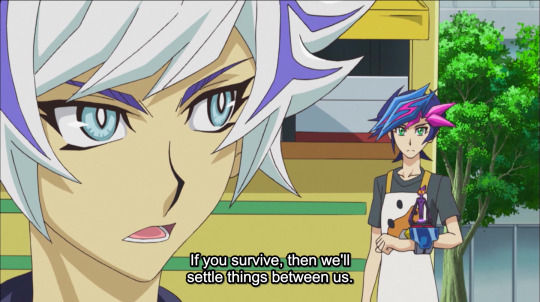
To Yusaku’s face Ryoken acts rather condescending and disdainful, but behind Yusaku’s back he acts like this what talking about Yusaku:
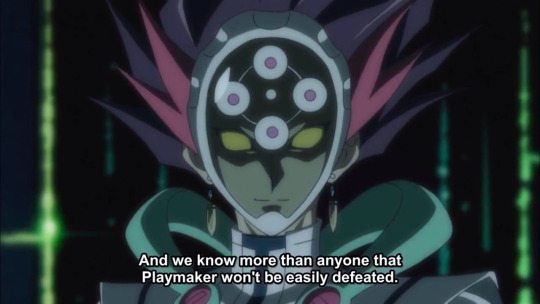
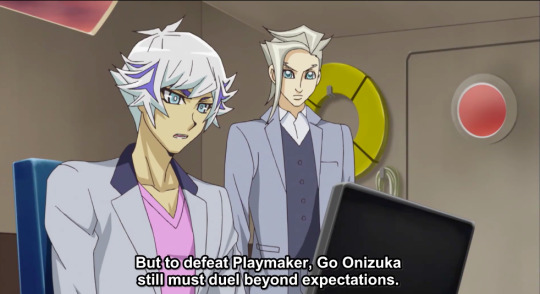
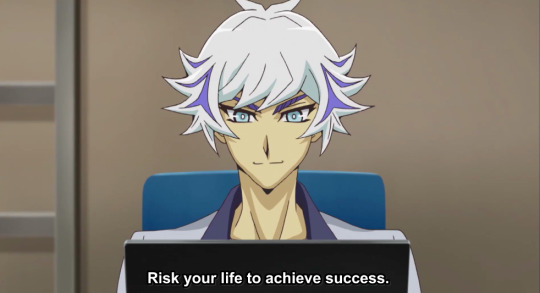
He still holds Yusaku in the highest regard: he talks about Yusaku with more respect and admiration than he does with anyone, even his father. He believes in Yusaku, and seemingly, in their destiny.
Ryoken does care, and he has changed, but he’s not done changing yet. He’s far from the desperate teenager that almost got thousands of people killed he was in the season 1 finale. He’s not trying to hurt anyone anymore, and knows it. He has resolved the conflict of interest that drove everything off the rails before and sent him to the brink: having to defeat Playmaker but so obviously not wanting to endanger Yusaku further.
Don’t get me wrong, he very much still regards Yusaku as his final obstacle. I think what Ryoken really seeks in regards to Yusaku is closure on everything that happened with his father and the Hanoi Project. Yusaku/Playmaker is the result of his mistakes, a representation and embodiment of everything he regrets. Both a dangerous enemy and a powerful ally of his own making, which is why Ryoken thinks he’s the one that must fight Playmaker. Only by either accepting Yusaku or defeating him will Ryoken ever really be able to move past his guilt and regrets.
...This got so long I don’t even know if I answered the question anymore...my head is swimming with screenshots of alien cyber terrorist boy...
137 notes
·
View notes
Note
Hey JJ, I was wondering what is your opinion on Klaine and the relationship between them and Brittana. Also I have a friend whose really obsessed with you and your blog and she reads it religiously so that must mean that your stuff is good ;) hope your day is going well :)))
Hey, @ruskinino!
First off, thank you forthe sweet message. Sorry it has taken me so long to post a reply.
Second, in response to yourquestion:
While both TPTB at Glee and fanon might like toimagine a close and straightforwardly friendly bond between Brittana andKlaine, I think that, in reality, things are much more complicated, and,unfortunately, less positive.
The two couples don’t hate each other, but thereis certainly a degree of caution in the way they interact, with both sides having been burned in the past.
We can break the issues down after the cut.
WARNING: I am writing this response as a fan of Brittany Pierceand Santana Lopez and a Brittana shipper. Though my intention isn’t to bashKurt Hummel, Blaine Anderson, or Klaine, there are elements of my analysis thatare critical of their behavior and which discuss some negative views which I believethat Brittany and Santana hold towards them. If you ship Klaine, proceedcautiously. What follows probably won’t be your cup of tea.
___
Brittana, Klaine, and Glee’s Writing
First, let’s talk aboutBrittana and Klaine on a production level.
In terms of Glee marketing,Brittana and Klaine were very important. For a show that prided itself on itsdiversity and forward-thinkingness, having two same-sex teen couples at itsfront and center was a big deal. While a lot of the critical praise for Gleedied off before the first season had even ended, the show continued toaccumulate awards from GLAAD, the Trevor Project, and other LGBTQ organizationsthroughout its run thanks, in no small part, to Brittana and Klaine’sprominence.
For PR purposes, Brittanaand Klaine were often paired together in promotional materials and paralleledin episode structures. RIB loved putting them side by side because when they did,it got everyone’s attention. If having one same-sex couple getmarried on TV was a huge thing, then having two same-sex couples get married onTV at the same time was an even huger one. It was all about doubling up, and thepowers that be at Glee took the opportunity to put two and twotogether when they could.
That said, Brittana +Klaine was often better executed in idea than in practice.
The truth is that asidefrom being LGBTQ and participating in show choir, Brittana and Klaine were twovery different couples, and Brittany, Santana, Kurt, and Blaine were four verydifferent characters. While in theory there exists a fictional universe wherethey all (or at least most of them) could have been friends—a point which manyexcellent fanfics well prove—the canon Gleeverse wasn’t it, mostly because thewriters never put in the work to really establish those interpersonal dynamics.
Brittana and Klaineran in the same circles and frequently orbited around one another in terms oftheir storylines and character development, but the narration never truly allowedthem to get to know one another or to form stable bonds.
Despite various comingstogether, at the end of six seasons, shared wedding notwithstanding, one nevergot the sense that Brittana and Klaine were actually very good friends. Sure,they didn’t hate one another, but there was also no deep love between them.Klaine were still questioning Brittana’s motives. Brittana were still mockingKlaine’s clothing, mannerisms, and relationship status.
Glee had failed to provethat these kids actually liked and related to one another on any special level.It was just another instance in which Glee kept trying to tell us that thesecharacters were friends, but they never showed us that such was the case (see here).
For as much as fanon lovesto imagine what might have been, canon shows us a much more convoluted—and muchless pretty—picture, one in which, due to a history of bullying and hijinks,Klaine never got comfortable enough to drop their guards around Brittana, andso, after years of repeated rebuffs and rejections, Brittana eventually grewfrustrated with Klaine’s distrust of them and emotionally disengaged.
So now let’s talk aboutthese relationships “in universe.”
Kurt and Brittany
The truth is that KurtHummel, like most of the characters on Glee, never really gets Brittany Pierce,and his view of her doesn’t change much between S1 and S6 (see here).
To Kurt, Brittany is simpleand strange—“a girl who thinks the square root of four is rainbows” and talks openlyand unironically about unicorns.
He tends to accept what hesees from her at face value, buying into the early stereotype she perpetuatesfor herself, namely that she is slutty and dumb, in some ways unaccountable forher own actions because she doesn’t understand what she is doing (see here).
Because Kurt’s initialimpression of Brittany is that there is not much to her, he never really thinksto look at what might be going on beneath her surface, and his opinion on hercharacter remains generally static. Consequently, he has trouble comprehendingher more nuanced behaviors, and he oftentimes patently misunderstands herbecause he is unaware of what her true motivations are and where her emotionalstakes lie.
Initially, the fact that Brittanyis one of the most popular girls in school is somewhat intimidating to Kurt, andespecially because she and the rest of the Unholy Trinity don’t mesh well withthe New Directions. For a long time, he doesn’t understand Brittany’smotivations for joining the glee club and so doesn’t entirely trust her. Whenshe is revealed as a spy in episode 1x13, he feels his distrust of her hasbeen validated (“You leaked the set list! You don’t want to behere. You were just Sue Sylvester’s little moles!”).It is well into S2 before he begins to trust that Brittany really wants to bepart of the glee club and that she isn’t just out for herself.
As time goes on andBrittany becomes more integrated into the group, Kurt tries to be nice to her inthe same way that people try to be nice to infants and pets, but oftentimes hispatience with her shenanigans wears thin, which is something that we see fromhim both when she serves as his beard in episode 1x18 and when she becomes his presidentialcampaign manager in episode 3x02.
When the things she saysbaffle him or when her behavior comes across to him as particularly nonsensical,Kurt has a tendency to snap at Brittany and drive her away. Lack ofunderstanding and patience for Brittany notwithstanding, Kurt does seem togenerally like her and is sometimes even protective of her. If asked, he wouldprobably say that he considers Brittany a friend, albeit not his closest one. Attimes, he even calls her by an affectionate short name, “Britt.”
Kurt and Santana
Kurt’s dynamic with Santanaover the years is similar to his dynamic with Brittany, in that it is alsopredicated on an initial poor first impression and the inability to advance thoseinitial views, even given an accumulation of new evidence.
To Kurt, Santana is thequintessential mean girl, motivated largely by malevolence and spite.
When she initially joinsglee club, he doubts her loyalties, just as he does Brittany’s. However,whereas the biggest fault he finds with Brittany is that, in his view, she isstupid and has a bad taste in friends, with Santana, he finds that she isvicious and even dangerous, particularly as she has a tendency to makehomophobic comments towards him (K: “Can we talk about the giant elephant inthe room?” S: “Your sexuality?”).
While there is some debateas to whether or not Kurt realizes that Santana is gay prior to her S3 outing, thefact is that, no matter what he knows or doesn’t know, he remains fairly alooffrom her throughout S1 and S2, and, in the few instances when they do interact,he is openly wary of her intentions.
In his mind, Santana isinherently selfish, so the idea that she would put herself on the line forsomeone else without expecting anything in return just doesn’t add up to him. Why does she protect him from Dave Karofsky? How come she goes out of her way to get him back to WMHS from Dalton? What gives with her suddenly using her prom queen campaign to protect him when for the lastseveral years she has taken every opportunity to bully him for being gay?
His cautious attitude towardsher continues into S3, when he doesn’t know exactly what to make of herattempts to be nice to him and behaves towards her as one might a cat that hadpreviously attacked him but is now purring. Though after her outing, he has abetter idea of why she does some of the things she does—such as going with him,Blaine, and Brittany to confront Sebastian Smythe after Dave Karofsky’s suicideattempt—much of her behavior still remains a mystery in his mind.
Why, for instance, does shenot appreciate his and Blaine’s attempts to serenade her during Lady MusicWeek?
In S4, when Santana becomeshis roommate in NYC, Kurt finds her behavior invasive and at times infuriating,though he generally gets along with her better than Rachel does.
In S5, he feels forced to choosebetween his loyalties to Santana and his loyalties to Rachel, and he inevitablychooses the latter.
In S6, he regards Santanaas a friend, though he still struggles to reconcile her behavior with what hethinks he knows about her basic motivations, which is why it so surprises himwhen she seemingly “out of the blue” decides to share her wedding day with himand Blaine.
As I discuss elsewhere,
Santana spends much of S1 and S2 making homophobic comments aboutKurt, so, to him, Santana is a mean girl, and he never really allows her togrow out of that role in his eyes.
Though in later seasons she becomes his roommate and tries tobecome his friend, he always keeps her at arm’s length and will side withRachel over her in a heartbeat, even in situations where Rachel is in thewrong.
At best, Santana is his fun, bitchy lesbian acquaintance. Atworst, she is his caustic, bitchy lesbian acquaintance.
He seems convinced that she is an awful person who sometimesmasquerades as a sweetheart rather than a sweetheart who sometimes masqueradesas an awful person, and he treats her accordingly, for the most part—though, infairness, he seems somewhat more amiable toward Santana than is Rachel, on thewhole.
Kurtand Brittana
As stated above, Kurt’sopinions of both Brittany and Santana remain fairly static throughout theentire series. When he first gets to know Brittana, he observes that Brittanyis a ditz and Santana is a bully, and his views on them don’t much change overthe course of the next six years.
If he encounters behavior fromthem which deviates from what he thinks he knows about their characters, then hecounts that behavior as aberrant and doesn’t shift his schema to allow for thenew evidence.
In other words, if Brittanydoes something undeniably clever, then he is likely to suppose it was anaccident—an exception rather than the rule. Ditto for if Santana does somethingcertifiably nice.
By S6, he knows enough torealize that, generally speaking, he and Brittana are on the same side.However, he continues to doubt their intentions, and, even up to the pointwhere they are graciously sharing their wedding day with him and Blaine, hestill questions their characters, failing to understand that they have grownand changed a lot since they were fifteen years old.
Overall, he does notunderstand Brittana’s dynamic. He either assumes that they function like he andBlaine do (see episode 6x03)—which they don’t—or else just plain fails to wraphis head around how they behave and what they feel for each other,underestimating the strength and depth of their bond. At his core, he can’t seewhat they see in each other. Why would someone like Brittany want to be withsomeone like Santana? Why would someone like Santana want to be with someonelike Brittany? What do they have in common? How do they make things work?
Brittana really are amystery to Kurt, but one he doesn’t spend too much time trying to unravel.
The fact that he soadamantly opposes their engagement even after six years of knowing them showsthat he doesn’t really get what they’re all about because, if he did, he wouldrealize that through all the ups and downs and changes with them throughout thetime that he has known them, they’ve always been each other’s only constant,and their bond with each other is strong, deep, and mature.
Brittany and Kurt
In S1, Brittany primarilyseems to pity Kurt Hummel—and especially because she very much understands hisunderlying motivations at that time.
Brittany is out long beforeKurt is, and she seemingly never wrestles with her own sense of identity in theway that Kurt does (see here).However, she does still feel for Kurt, and particularly as she recognizes thathe and Santana are essentially in the same boat.
Though at this point in theshow, few people would see similarities between an unpopular, virginal gaychoir boy and a popular, slutty “straight” cheerleader, Brittany knowsthat Kurt and Santana actually share much in common, albeit below thesurface.
Both Kurt and Santana carrya secret that that they’re desperately trying to suppress. Both Kurt andSantana worry that if they are honest about their identities, they will losethe love of their family members. Both Kurt and Santana perform socialgymnastics in order to maintain a sense of equilibrium in their lives, tryingdesperately to balance who they really are with who they think they need to bein order to survive.
Brittany is aware longbefore Santana says it out loud that Santana looks to Kurt as thequintessential canary down the mineshaft and that anything she sees happeningto him, she fears will also happen to her. Whenever Kurt faces homophobia orsuffers a setback as he negotiates his outness, Santana takes note, andBrittany, by extension, does, too.
In my view, that is why throughout S1 we see several instancesin which Brittany helps Kurt to interact with his father on his own terms, suchas in episode 1x04, when she and Tina convince Burt that Kurt is on thefootball team so that Kurt can save face (see here),and in episode 1x18, when she acts as Kurt’s beard so that Kurt can prove toBurt that he is “straight” (see here).
At this point in herdevelopment, Brittany is still very much in the business of helping Santana tomaintain the illusion of their straightness, and she essentially does the samething for Kurt. While she may not personally feel the need to hide her same-sexattractions, she knows that Kurt and Santana do, and she doesn’t hesitate toplay along in their schemes to convince the world that they are “outstandingheterosexuals,” no matter how overblown and ineffectual said schemes may be.
It is only as Brittanystarts to change how she relates to Santana during S2 that her relationshipwith Kurt also changes, and she becomes less about trying to help him obfuscate his true self and more about helping him to celebrate it.
Nowhere is this attitudefrom her more apparent than in episode 2x20, when she acknowledges how strongKurt has to be in order to be himself and encourages Santana to stand by him inhis time of trouble (“Go back out there and be there for Kurt. This is gonna bea lot harder for him than it is for you”).
While there is an element of self-service to Brittany’s actionsin this situation—Santana helping Kurt to feel comfortable with himself in turnhelps Santana to feel comfortable with herself, and a comfortable Santana isone who will be able to date Brittany—there is also some genuine pride andappreciation underlying them.
Brittany is glad that Kurt has gone from being someone who wouldlie to his father about having a girlfriend to being someone who can takeownership of a shitty situation by saying, “I’m proud to be who I am.” She seesthe progress he has made, and she applauds his real bravado.
Though she hasn’t said so out loud, to this point in the show,Brittany has considered herself to be in a position to “help Kurt up.” While hehas struggled to accept himself and later to forge his identity as an out gaykid at a conservative school, Brittany has already been there, and she has beenquietly watching him, lending him help when she can, and rooting for him fromthe sidelines.
Come S3, she feels that Kurt has finally peaked and that theyare now on equal footing in terms of being comfortable in their own skins.
That’s why she turns to him as an ally in her quest to make WMHSa safe place for other, potentially still-closeted LGBTQ kids, includingSantana—because she assumes that she and Kurt are both in a position to helpothers reach the point they’ve gotten to and that they’re on the same pageabout the importance of activism in their community (see here).
Her assumption is a mistake not because Kurt doesn’t care aboutLGBTQ causes but because he doesn’t understand her and her motivations.
For one thing, like most people at the school, Kurt doesn’t seemto think of Brittany as bisexual, her openness concerning her orientationnotwithstanding (see hereand here).Particularly given that Brittany and Santana are not yet openly dating at thetime when episode 3x02 takes place, Kurt doesn’t get that Brittany has theproverbial dog in this fight. In his mind, she is an ally at best, so it’s nother personal safety, comfort, and wellbeing that are going on the line in thiscampaign, just his. He is the out gay kid, so he’s the one that will have to facethe backlash, not Brittany, who, according to his understanding, is ostensiblystraight.
For another thing, because Kurt views Brittany as naïve, he believesthat she is wildly oversimplifying the matter at hand and that she doesn’tunderstand the grander implications of her own actions. He assumes that shethinks that running a campaign of this nature will be easy and that no one willpush back against it because her world is all rainbows, puppies, andbutterflies. He doesn’t realize that Brittany has been watching how peoplereact to him for as long as they’ve known each other. He also doesn’t get thatshe is smart enough to know what happens to anyone who dares to be toodifferent at their school.
While Kurt is finally to the place where he is comfortableclaiming his identity as a gay man and publicly being in a relationship withBlaine, he isn’t eager to become the face of the gay rights movement atWMHS—and especially not after being driven to Dalton the year before. The waypeople react to him is different than the way people react to Brittany andalways has been. While she may be comfortable associating herself with ProjectUnicorn, he isn’t, and so he and Brittany butt heads.
Whereas in the past when Kurt has snapped at Brittany (see episodes1x18 and 2x02), Brittany has typically backed off and done as Kurt says, in S3,Brittany actually stands up to Kurt, and the fact that she does so isreflective of her own personal growth during the Back Six of S2.
That said, it is also reflective of her changed view of Kurt nowthat he is out and more at ease in his own skin. In the past, Brittany viewedKurt as delicate, so she was all about being gentle with him and going alongwith things at his pace so as not to spook him. Now she knows that he isconfident in himself and that he can handle tough love. In her mind, that meansthat she can take the kiddie gloves off with him. So she does.
When Kurt says he doesn’t want her to run his campaign for thesenior class presidency, Brittany comes back swinging. Though she initiallyshows shock and disappointment about his decision, after a pep talk fromSantana, she tells Kurt that she is going to continue the campaign without him,becoming a candidate herself. While she isn’t mean about what she says, she isfirm, and she doesn’t back down.
This action represents a major shift in the way Brittany relatesto Kurt. No longer does she pity him or look at him as someone she has to baby.
—and that point is important, because going forward into S3,Brittany really seems to take off her rose-tinted glasses when it comes toKurt and how he treats her.
Brittany has always been aware that everyone aside from Santanathinks she’s stupid. Some people are meaner about it, like Finn, while somepeople are nicer about it, like Mercedes. It’s the difference between outrightdisdain and condescension versus “being too gentle” with her. Kurt was alwayson the nicer end of the continuum. Brittany knew he didn’t think of her as anintellectual equal, but she was willing to let it slide because at least mostof the time he was kind.
But as their political campaign heats up, Kurt starts to getannoyed with Brittany’s antics—and particularly as she gains over him in thepolls—and his interactions with her become noticeably harsher. Whereas beforehe always at least tried to hide the fact that he thought she was as dumb as abox of rocks, now he is much more open in his patronization, and Brittany isn’thaving it (see episode 3x03).
Between the disrespect he shows Brittany as a political rivaland his participation in Santana’s humiliating public outing experience (seeepisode 3x07), Brittany starts to get a bit passive aggressive towards Kurt. Ofcourse, it’s not that she outright hates the kid—she still likes him wellenough—it’s just that she is no longer giving him a free pass in how he treatsother people.
That attitude is the one she carries into S4 and S5, as Kurtgraduates and moves to New York, where Santana eventually becomes his roommate.While Brittany doesn’t have much direct contact with Kurt during this time, shehears through the grapevine about how he is treating her girl, and, honestly,the reports leave her troubled.
That Rachel and Kurt would kick Santana out of first the Loftand later Pamela Lansbury when Santana wants nothing more than to be theirfriends doesn’t sit well with Brittany. That Santana always seems to have tobeg for Hummelberry’s acceptance and friendship even though she freely givesthose things to them hurts Brittany’s heart.
In episodes 5x12 and 5x13 especially, Brittany sees just howmuch of a toll it has taken on Santana to constantly have to be on her guardaround Hummelberry, and she feels frustrated because things didn’t have to bethat way.
If Kurt had just dropped his guard, Santana would have been hisfriend to the end. Couldn’t he see?
Again, Brittany doesn’t hate Kurt for his behavior, but she alsodoesn’t entirely excuse it. In her mind, Kurt can be a nice guy when doesn’thave his head up his ass. It’s just that Kurt does have his head up his ass alot, and particularly when he is caught up in the constant drama that seems tosurround Rachel and Blaine.
Honestly, Brittany is never a big fan of Blaine, a point whichwe’ll discuss in more detail later.
Come S6 when Brittany starts interacting with Kurt on theregular again, her m.o. seems to be that she wants to remind him to be true tohimself and to heed his better impulses. She goes about doing so by behavingpassive-aggressively towards Kurt when he fails to toe the line (see episode6x02) and calling him out when he crosses it (see episode 6x03). Throughoutthis season, we see her use more tricksy troll!Brittany behavior on him thanshe ever has before, usually with the intent to take him down a peg or two whenshe believes he is getting too full of himself (see here).
At this point, Brittany knows that Kurt will probably neverfully get her and Santana and that their relationship will never be superclose, even given their shared history at WMHS. Still, she wants to be ondecent terms with him, and she wants him to show her and Santana basic respect,even if he doesn’t understand them or their dynamic at all.
As for Brittany’s push to share her wedding with Kurt andBlaine, suffice it to say that there’s a lot more to that story than meets theeye, and, despite what she professes, Brittany is no Klaine shipper (see here).Brittany has her eye on a prize in that situation, and Kurt is just in thedetails. She is on her way to a happy ending, and if she has to let him mooch herwedding venue to do so, then so be it.
Her attitude in that episode is indicative of her overall attitudetoward Kurt to end the show: She feels like she and Santana tried to connectwith him, but it never worked out. At first, she was hurt by the fact that Kurtnever came to understand her—and especially that he never came to understandSantana—but now she’s over it. She can be friends with him on a superficiallevel as long as he’s nice to them, but she’s not going to sit back and let himtreat her or Santana badly anymore. She knows they’re worth more than that,whether Kurt sees it or not. In the end, Kurttany has become a fairly neutralrelationship, and Brittany’s m.o. with it is to do no harm and take no shit.
Brittany and Blaine andKlaine’s Relationship
As I discuss elsewhere,
While Brittany doesn’t hate Blaine like she hates Rachel, she alsoisn’t his number one fan. In general, Brittany doesn’t take well to anyone whobelieves that they’re better than everyone else, so Blaine going after everysolo and role and class presidency with aplomb, regardless of whom he steps onto do so, doesn’t sit well with her. Brittany believes in being a team player,and, the way she sees it, Blaine isn’t one. He will always put himself in thepoint position, even if he isn’t the best person for the job.
—which brings us to his treatment of Kurt.
Historically, Brittany has been protective of Kurt, as she cansympathize with him (see here, here, and here).Brittany likes to see Kurt succeed because she likes the idea that someone whomarches to the beat of his own drummer can make it in a world that tries tomake everyone conform—hence why she helps Kurt with his campaign and why sheacts as his background singer for his NYADA audition and why she is generallynice to him, even though they’re not necessarily close friends.
Of course, just because Brittany generally likes Kurt and wantshim to succeed doesn’t mean she always agrees with him and his choices or willrefrain from giving him a little bit of tough love should she feel the need todo so.
Enter her “advice” to Kurt in episode 6x02 “Homecoming.”
Brittany has watched Kurt’s relationship with Blaine from thestart, and, honestly? I don’t think she likes most of what she sees.
For Brittany, a real partnership is about two people supportingeach other and helping each other to fulfill their dreams, and from Brittany’sperspective, I don’t think she sees Blaine doing those things for Kurt, thoughKurt often does them for Blaine.
In her eyes, when Kurt and Blaine both want the same thing—i.e., asolo in glee club, a role in the school play, a prestige spot at NYADA, acertain rule to be honored in their relationship—Blaine almost inevitably endsup getting whatever the thing is, with Kurt stepping aside or bowing out inorder to allow him to have it.
Add on the fact that Brittany has undoubtedly heard all about the“Klaine can’t live together without fighting” fiasco from Santana, and,frankly, I think Brittany probably views Blaine as a negative factor in Kurt’slife rather than a positive one.
That said, Brittany is all about respecting the choices peoplemake for themselves, so for as passive-aggressive as she may be about and eventowards Blaine, she isn’t going to stand in Kurt’s way once he decides he wantsto be with Blaine forever.
If Kurt loves and wants to be with Blaine, then Kurt loves andwants to be with Blaine, and Brittany will accept that Blaine is Kurt’s person,even if she doesn’t understand the appeal (see episode 6x03 and 6x08).
Santana and Kurt
Santana’s relationship with Kurt follows a similar trajectory toBrittany’s.
However, while Brittany runs through the cycle of sympathizing withKurt, wanting to befriend him, realizing that a deep friendship with him is notpossible because he never makes an effort to understand her, and then gettingover it mostly over the course of S1-S3 (at least on her own account),Santana’s cycle runs over the course of the whole series, and it runs on higheroctane than Brittany’s does overall.
Santana is the more emotionally reactive half of Brittana, so shetends to take things with Kurt harder than does Brittany on a whole, and especiallybecause her relationship with him is wrapped up in her own sense of identity asa gay person and in her dynamics with Brittany, Rachel, and her feelings abouther future, and it is marked by insecurity from start almost to finish.
As I say elsewhere,
Santana’s relationship with Kurt iscomplicated.
On the one hand, she spent much of high school wishing she couldbe him: i.e., the out gay kid who persisted in being himself no matter whatopposition he faced.
On the other hand, she spent much of high school terrified to behim: i.e., the out gay kid who got thrown into lockers and roughed up andtossed into dumpsters and hated on and threatened because he was gay (“I mean,you know what happened to Kurt at this school”).
Kurt was simultaneously an object of both devotion and fear forSantana. In spite of herself, she identified with him very strongly. She sawhis successes as successes she could possibly have and his failures as failuresshe could potentially experience (see Santana intervening to save Klaine fromKarofsky’s wrath in 2x18 and Santana’s panic after Kurt becomes prom queen in2x20).
That’s part of why she worked so hard to make WMHS safe for Kurtin Season Two, long before she herself came out (see here).
During Season Two, Kurt was more of a symbol to Santana thansomeone with whom she had an actual relationship, but during Season Three, shemade her first overtures of real friendship to him, reaching out to him whenSebastian and the Warblers tried to hurt him and Blaine (“Today is your luckyday, because Auntie Snixx just arrived on the Bitch Town Express”).
In her mind, Santana had done Kurt several solids by thispoint—i.e., forming the Bully Whips on his behalf, bringing him back to WMHSfrom Dalton, singing to him at prom despite her own fears, taking downSebastian after Sebastian hurt Blaine, etc.—and the fact that she had done soplus her and Kurt’s shared experience of being out gay kids at WMHS should havebeen enough to make them friends.
We see Santana operate under the assumption that she andKurt are friends throughout Season Four, answering his summonsto stage an intervention for Rachel in 4x12 and bringing him Christmas presentsin 5x08 (the events of whichtake place during Season Four chronologically). Though Santana stillcalls Kurt names, she assumes he knows that she only does so because she likeshim.
That being the case, she fully expects him and Rachel to welcomeher into the Loft with open arms (and particularly as Rachel actually invitedher to live in the Loft during the events of 5x08).
Unfortunately, that’s not what happens.
From the very first time Santana does something nice forKurt—i.e., forming the Bully Whips in 2x18—Kurt questions her motivations in sodoing. Why is the girl who openly mocked him and attempted to sabotage the gleeclub during their sophomore year suddenly buddying up to him in their junioryear? Surely someone as selfish as Santana can’t have altruistic motives. Shemust have either lost her mind or stand to profit from helping Kurt somehow.
Even when he learns that Santana is gay come Season Three, Kurtstill views her largely as an outsider, and his distrust (andmisunderstanding) of her continues well into Season Four, when she moves intothe Loft.
To be fair, navigating the Hummelpezberry dynamic is trickybusiness, and particularly for Kurt, who often finds himself in theuncomfortable position of mediating between Rachel and Santana, both of whomget up to some pretty wild hijinks and who often butt heads with each other.
Kurt is a natural peacemaker, and he dislikes having contention inhis home, so he will try to counsel Rachel and Santana through their disputesas much as he is able.
That said, at the end of the day, Kurt is Rachel’s best friend, notSantana’s, so while he may try to maintain his neutrality concerning theirdisputes, when push comes to shove, he almost always sides with Rachel in theend, as per what we see during the Pezberry Funny Girl disputeof early Season Five.
As I say elsewhere:
While there is certainly no shortage of wittybanter and fun musical numbers between roomies Kurt, Santana, and Rachel, thereis a shortage of “relationship-building” scenes—or at least a shortage oflasting “relationship-building” scenes that the Glee writers don’t subsequentlyrescind, ignore, or negate.
For every one friendly gesture Hummelberry andSantana make towards one another—such as, for instance, when Santana helpsRachel through her pregnancy scare in episode 4x15 or when Rachel encouragesSantana not to give up on her dreams in the first scene of episode 5x09—thereare at least two or three scenes that then show how very unstable their dynamicactually is—such as when Hummelberry kick Santana out of the Loft in 4x16 andSantana and Rachel are at each other’s throats throughout most of 5x09 and5x10.
Just as it was always the case that the UnholyTrinity broke down into units of Brittana + Quinn, it is also the case thatHummelpezberry breaks down into units of Hummelberry + Santana, with Santana asthe odd one out.
Not only do Kurt and Rachel frequently form ranksto outvote Santana, but their bond as Hummelberry can exist independent of her,whereas her bonds as part of Pezberry and Kurtana are largely dependent onHummelberry’s bond with each other—i.e., Kurt serves as a necessary peacemakerbetween Pezberry, allowing their friendship to exist, while a common interestin and exasperation with Rachel and her antics is what keeps Kurtana united.
Santana’s bond with Kurt is more stable thanSantana’s bond with Rachel, which is to say that Santana and Kurt are lesslikely to fight than Santana and Rachel are. However, Santana’s bond with Kurtis also weaker than her bond with Rachel is, which is to say that Santana hasless in common with Kurt than she does with Rachel and also that Santana feelsthat Kurt needs her less than Rachel does.
Of course, both Santana’s bond with Kurt ANDSantana’s bond with Rachel are relatively weak compared with Kurt and Rachel’sbond to each other.
If it comes down to it, Hummelberry’s tendency isto have each other’s backs. Though they like Santana to a degree, she is extraneousto them.
And the thing is that Santana knows it.
Santana knows the difference between a secureattachment and an insecure one, and she knows that while Hummelberry aresecurely attached to each other, they are, for the most part, insecurelyattached to her. Santana knows that Hummelberry will tolerate her as long asshe is on her best behavior, and she fears the implications of theirtoleration.
Frankly, Santana is terrified of stepping one toeout of line, lest Hummelberry kick her out of the Loft again—because for asmuch as Santana says that she needs her job at the diner, she needs her placeat the Loft equally as much.
So while Santana ultimately fights less with Kurt than she doeswith Rachel, her relationship with him is just as tenuous and one-sided as isPezberry’s.
She ultimately never achieves the kind of intimacy and secureattachment to Kurt that she craves.
So cut to Season Six, when Kurt objects to Santana’s proposal toBrittany (see here):
Santana is angry that she tried for years toprove to Kurt that she was his friend, and he responded by evicting her fromthe Loft, questioning her intentions in auditioning to play Rachel’sunderstudy, kicking her out of his band, making her feel like a stranger in herown home, being ungrateful when she saved him from his high school bully anddefended Blaine against Sebastian Warbler on his behalf and scored him a job atthe diner and brought her girlfriend into his band and participated (graciouslyand quietly) in his proposal to Blaine and spent time socializing with andgetting to know him, being kind to him in his down moments, giving him soundadvice in a way that no one else was honest enough to do, etc.
Santana is angry that despite her trying herdamnedest to show Kurt that she was not the same girl he knew in highschool—that she wasn’t wrathful anymore, that she was generous, that she waswilling to share her heart in friendship with anyone who would treat it withcare—he never believed her. He always thought the worst of her. He kept her onthe outside, when she so desperately craved (and worked hard to earn) histrust.
Santana is angry but mostly she is hurt.
Santana is hurt because she genuinely cares aboutwhat happens to Kurt, but he has just shown her that he doesn’t give a damnabout what’s most important to her in return.
She showed him her precious things, and hetreated them like they were garbage.
Kurt was supposed to be Santana’s friend, and itbreaks her heart that he isn’t.
So while Santana’s capacity to forgive is muchgreater than most people generally give her credit for—and often even greaterthan those who wrong her might deserve—she does inevitably reach a point whereshe just can’t take it anymore.
And so when Kurt fucks up something that isimportant to Santana, that is sacred to her, that’s supposed to be beautifuland happy and pure, by lecturing her about learning from his mistakes? Sheloses it.
To Santana, it’s just another example of howeverything about the Kurtana relationship has always been about Kurt.
It is no coincidence that Santana spends the months that herrelationship with Brittany is at its most tenuous chasing after Kurt’sapproval. Throughout S4 and early S5, she is desperate for a place to belongand something to hold onto, and she keeps hoping that Kurt will take pity onher. She has always envied the courage he has to be himself, and now that sheis scrambling to figure out who she is outside of high school, she seeks toally herself with him, thinking that maybe some of his self-determination willrub off on her and help her find her direction.
It takes until episode 6x03, when Kurt objects to her proposal toBrittany, for Santana to realize that she should stop killing herself to winKurt’s love and approval, as, in the end, she is probably never going to getit. Going forward, she doesn’t bear Kurt ill-will. She just isn’t as hung up onwhat he thinks of her, largely because she has found where she belongs and shehas a better sense of who she is, regardless of what anyone might think. Thesecurity she feels in her relationship with Brittany makes up for the insecurityshe feels in her relationship with Kurt (and also Rachel). She’ll be friendlywith them on a superficial level, but when they inevitably do something todisappoint her, she isn’t going to take it personally—not anymore.
This attitude towards Kurt is the one that Santana carries intoher wedding day, and it is what allows her to offer up her nuptials for Klaineto take part in as well. Everything that has happened between Santana and Kurtover the years is water under the bridge now, so if Brittany wants Klaine toget married at her and Santana’s wedding, then Santana is cool with it. She’sgame. She can be altruistic, and if Kurt notices, then awesome, but if not,that’s his deal. She doesn’t need his validation anymore. She is just going tobe herself.
Santanaand Blaine and Klaine’s Relationship
The central dynamic between Brittana and Klaine is always mostlybetween Brittana and Kurt, as neither Brittany nor Santana has much of apersonal relationship with Blaine beyond his being Kurt’s boyfriend/fiancé/husband.
To this end, Santana and Blaine don’t often interact on a one-to-one basis, andmost of their exchanges center on and are filtered through Kurt.
On the few occasions when Santana does take notice of Blaine forreasons not directly related to Kurt, her interactions with him are notnecessarily positive.
In episode 2x12, Blainetana get off to a bad start when Blainesingles Santana out at BreadStix, singing to her that she may never find loveat all and compounding her already horrible, awful, no good, very badValentine’s Day by drawing attention to her loneliness and (inadvertently)playing on her fears.
Things get worse in S3 after Blaine transfers to WMHS from Daltonand immediately starts grabbing up solos left and right, exacerbating Santana’ssense that there is no place for her in an already crowded New Directions (seeepisode 3x04).
That said, though Santana does not have much love for Blaine on apersonal level, she is willing to tolerate him for Kurt’s sake.
In general, Santana follows the same rule as Brittany when itcomes to how she treats Blaine and his relationship with Kurt, which is to saythat, though she may not personally see Blaine’s appeal for Kurt or think that Blaineis a particularly good match for him, she acknowledges that if Blaine is Kurt’sman, then Blaine is Kurt’s man, and so treats him like a friend for Kurt’s sake.In her case, “treating Blaine like a friend for Kurt’s sake” translates to hersnarking at him as she does at Kurt but also protecting him like her own whenneeds be.
The place where this behavior from her is most apparent is inepisode 3x11, when she “goes to battle” against Sebastian Smythe after hethrows rock salt in Blaine’s eye, sending Blaine to the hospital. Her musicalduel against Sebastian and the reconnaissance work she does against him is allfor Blaine’s benefit, a way to prove that Sebastian is guilty and get him backgood for what he’s done.
To Santana, that’s just how one treats a friend’s significantother—and it’s what she would expect Kurt to do for Brittany were the situationreversed.
Note: Santana’s expectation that friends should respect theirfriends’ relationships even if they don’t necessarily like or “get” themunderlies her hurt when Kurt objects to her proposal to Brittany in S6. No matterhow she feels about Blaine, she would never undermine Kurt’s right to be withhim or place her objections over Kurt’s feelings.
Overall, Santana seems to view Blaine as conceited and feelannoyed with him for his grandstanding, but she still accepts that Kurt loveshim, and that’s good enough for her. The only time she ever truly “goes after”Kurt and Blaine’s relationship is in episode 6x03, after Kurt objects to herproposal to Brittany. In that case, she is lashing out to hurt Kurt because hehurt her first. In her mind, he broke the “your friend’s relationship is sacred”rule, so she’s punishing him for it, plain and simple. The fact that she laterforgives Kurt enough to let him and Blaine share in her wedding proves that herdiatribe was mostly a nervous reaction and that, underneath everything, shebears Klaine no real malice. Again, she is over it, and if Kurt wants to marryBlaine, then that’s his business, and she’ll respect his decision.
Blaineand Brittana
As stated above, Blaine doesn’t have many individual interactionswith either Brittany or Santana, as he knows them mostly through Kurt (and, inBrittany’s case, through Sam).
That being the case, his views of the girls andtheir relationship seem mostly to fall in line with Kurt’s: He thinks Brittanyis dumb, Santana is mean, and Brittana is somewhat inexplicable. In general, heseems to be amused by the strangeness that is them, and he doesn’t really gettheir whole “thing,” but he plays it off because, well, why not?
On the few occasions when Brittana do nice things for him—such as when Santana protects him and Kurt from Karofsky in episode 2x17 or when Brittany invites him and Kurt to share in her and Santana’s weddding in 6x08—he is grateful, if befuddled, as he doesn’t really understand where the niceness is coming from.
Following Kurt’s lead, he never really pushes for a deeper or more intimate friendship with either Santana or Brittany or with Brittana as a couple. He seems mostly fine with the pleasant but superficial status quo and with Kurt being closer to the girls than he is. Whatever history is there, he’s not going to poke at. There is nothing that really personally compels him about Brittana, one way or the other.
Conclusion
Brittana and Klaine end the show as neither friends nor enemies.
Santana’s early bullying and Brittany’s seemingincomprehensibility put Kurt off on them early on, and Kurt’s inability tochange his opinions put them off on him later. Though over the years, they singplenty of songs together and show occasional care for one another, ultimately,they fail to achieve true understanding. To Kurt, Brittana are still asimpleton and a mean girl. He doesn’t recognize Brittany’s cleverness orSantana’s ooey-gooey center. To Brittana, Kurt is impossible. They feel theyhave tried to win his friendship to no avail, so now they’ve given up. Their relationshipstops just short of real intimacy. They have shared history, but they don’tbare their souls to one another.
In the end, Brittana and Klaine represent a failed experiment bothinside and outside of their fictional universe.
The writers tried to make “two same-sex couples as buddies” fetchhappen, but they never truly allowed the groups to overcome their rocky startswith each other. Their inability to scaffold and build up this friendshipcorrelates to a larger failure on their parts in the way that they wieldedSantana as a character—namely, that they never quite knew what to do with heronce they could no longer just straight up treat her as a villain following herdevelopment in S2.
They knew that Santana could be nice, but she made such aconvenient heavy that they were reluctant to label her a hero. Their attitudetoward her is reflected in Kurt’s treatment of her, and it accounts for many ofthe starts, stops, and stalls that she and Kurt experience over the years.
The same is also true to for Brittany and Kurt, as the writerswere never able to gracefully transition Brittany between what they had firstenvisioned her as in S1 and what they eventually made her into from S2 on, and,consequently, Kurt was never able to advance his views of her, either.
Since Kurt’s attitudes eventually became Blaine’s, the wholeBrittana and Klaine friendship stalled from the onset. For every one bondingmoment they experienced, there was always a fight or a misunderstanding or agrudge that prevented them from truly drawing close. Klaine keep their guards up. Brittana have hurt feelings and eventually move on.
Of course, none of this analysis is meant to discourage peoplefrom enjoying the idea of a Brittana and Klaine friendship in fic and fanon. It’sjust to say that, in canon, I think that the Glee writers choked in theirexecution and that the whole situation is a lot more complicated than itappears on the surface.
As for my own views on Klaine, I don’t personally ship them,though I respect those who do.
Sorry this answer turned into such a monster piece.
Thank you for the question!
#Crazy Brittanalyst answers#ruskinino#Also @dive-right-into-you: I got your question and I'm working on a response
38 notes
·
View notes